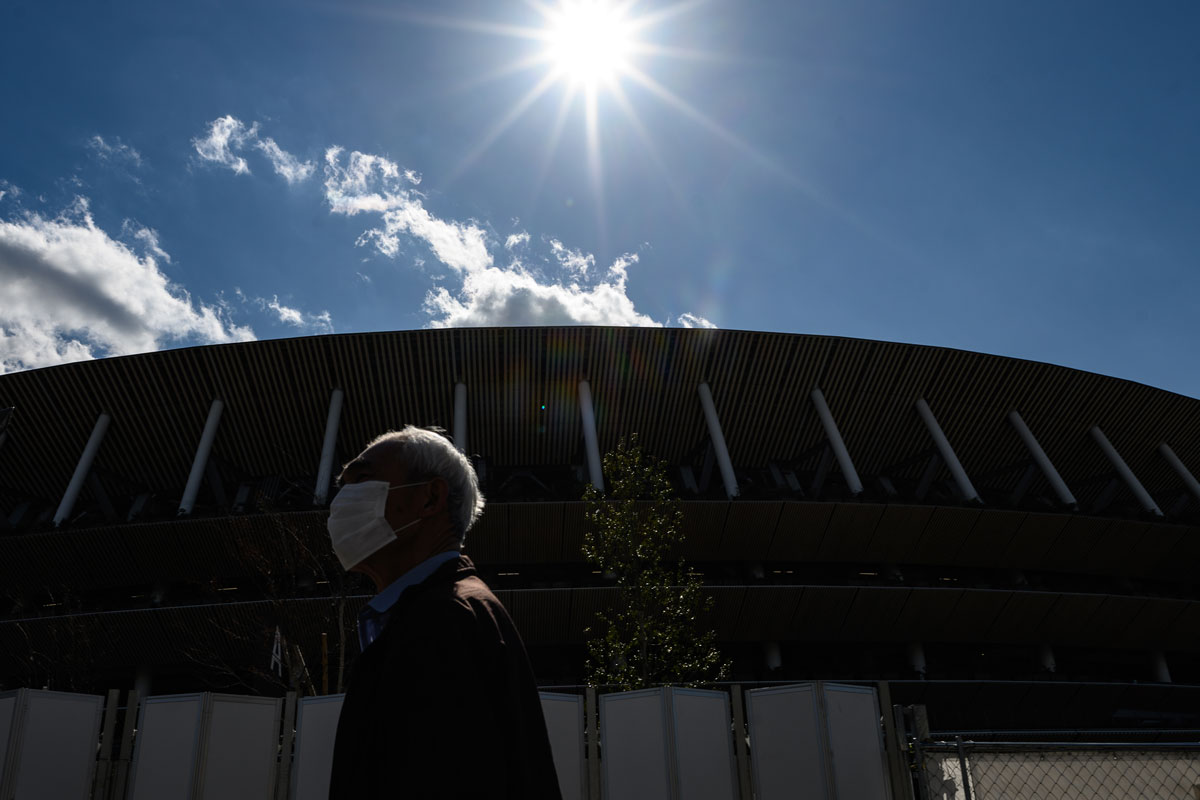Govt bonds worth Rs 32,000 crore to be auctioned on April 26
The Finance Ministry on Monday announced the sale of government bonds worth Rs 32,000 crore in two categories on April 26 (Friday).
The panic caused by the virus is clear in the stocks, bonds and other commodity prices.

A man wearing a facemask walks in front of a construction site of the National Stadium in Tokyo. (Photo: Philip FONG / AFP)
There is high probability of parts of the global economy slipping into a recession, said the Reserve Bank of India Governor Shaktikanta Das on Friday as he raised grave concerns over the economic impact and duration of the coronavirus pandemic (COVID-19).
The spread of the virus has sent financial markets across the world into a tailspin despite some of the biggest relief package announcement since the global financial crisis announced by several central banks across Europe, Asia, America and Australia.
Das noted that the global economic activity has come to a near standstill as COVID-19 related lockdowns and social distancing have been imposed across most countries.
Advertisement
“Expectations of a shallow recovery in 2020 from 2019’s decade low in global growth have been dashed,” Das said.
“The outlook is now heavily contingent upon the intensity, spread and duration of the pandemic. There is a rising probability that large parts of the global economy will slip into recession.”
Das, while announcing the emergency rate cut of 75 basis points said that the Monetary Policy Committee refrained from giving any outlook for the country’s inflation and growth due to the prevailing uncertainty.
“Given this heightened volatility, unprecedented uncertainty and extremely fluid state of affairs, projections of growth and inflation would be heavily contingent on the intensity, spread and duration of COVID-19. Precisely for these reasons, the MPC refrained from giving out specific growth and inflation numbers,” said Das.
“In fact, this kind of uncertainty has never been seen before,” he added.
The panic caused by the virus is clear in the stocks, bonds and other commodity prices.
Financial markets have become highly volatile from January onwards due to the outbreak of COVID-19, he said, adding that panic sell-offs have resulted in wealth destruction in equity markets across advanced and emerging economies alike.
Currencies of emerging and advanced economies are experiencing severe depreciation pressure on a daily basis because of fire sales due to extreme risk aversion, the Governor noted.
“At this point, only the US dollar remains safe haven in a highly uncertain outlook. Japanese yen and gold – the other two safe havens till the early part of March – have given way to a flight of cash. International crude prices initially traded with a softening bias from January in anticipation of demand weakening due to the COVID-19 outbreak.”
Speaking on the recent oil price war between major producers, Russia and Saudi Arabia, he said that production cut disagreements among key oil producers, however, set off retaliatory supply scale-ups and a price war that plunged international Brent crude prices to a low of $25 per barrel on March 18, 2020.
These developments are likely to dampen inflation across advanced and emerging economies, he added.
Das said that central bank and governments are in “war mode”, responding to the situation with several conventional and unconventional measures targeted at easing financial conditions to avoid a demand collapse and to prevent financial markets from freezing up due to illiquidity.
It is a much anticipated step which several industry players and experts have been seeking over the past one month to boost liquidity and the market and business, the RBI Governor on Friday announced an emergency repo rate cut of 75 basis points to 4.4 per cent, among other liquidity measures.
Advertisement